Crocs are some of the most comfortable shoes you’ll ever own.
But can you hike in Crocs?
You probably don’t want Crocs on your feet while attempting to summit Mt. Everest, but they’re a fine choice for leisure hiking and decent uphill climbs. Hikers love to bring Crocs along on trips because they can get wet, they’re comfortable, and they can take a beating.
Can you get hiking Crocs?
Currently, there are no Crocs made specifically for hiking. However, you can buy all-terrain Crocs that offer more tread and grip than your typical Crocs. The material is also a bit thicker and stronger to give hikers more support.

Crocs are an affordable choice for a durable shoe that provides a good amount of cushion, whether walking on flat trails or jumping around rocks. Seasoned hikers will often shove a pair of Crocs in their cars along with hiking boots and choose their footwear based on outdoor conditions.
Another reason Crocs are a great hiking shoe option is that they’re incredibly lightweight.
People hiking along trails like the Appalachian Trail tote Crocs along in their backpacks and break them out for easy trails or for moving around camp when the day of tough trekking is done.
Here’s what you need to know if you’re thinking about grabbing a pair of Crocs for hiking.
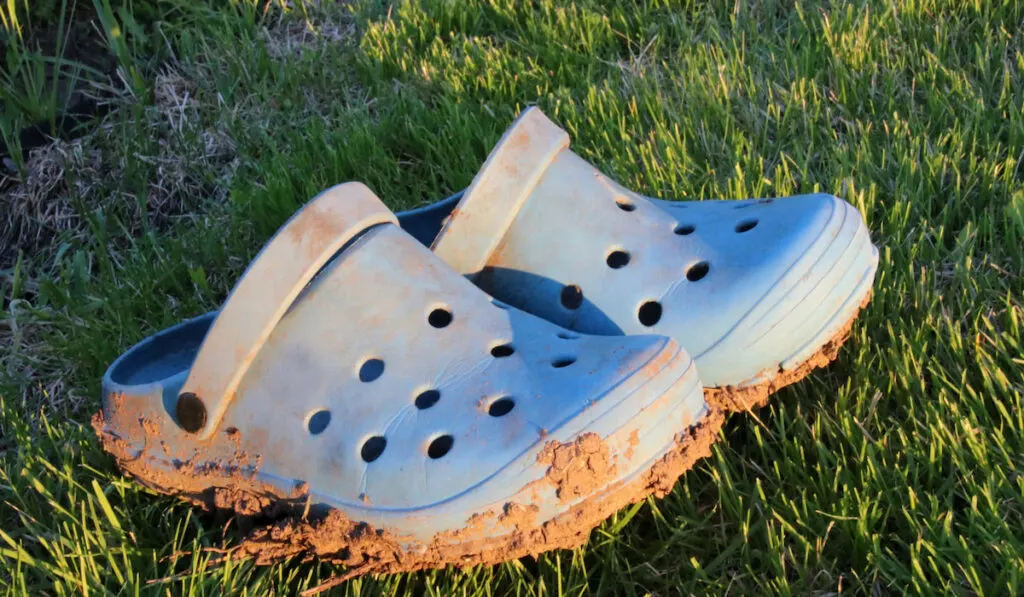
Table of Contents
Why Crocs Are a Great Hiking Shoe
Okay, so maybe calling them a great hiking shoe is a stretch, but don’t overlook just how good Crocs can be as an outdoor shoe overall.
People take a look at Crocs and giggle because they look a bit strange. Once they put them on, however, their tunes change.
Trying on Crocs changes so many minds because of how comfortable they are. They tend to squish just enough but still feel supportive under your feet.
Here are some of the main reasons why hikers love Crocs.
Affordability
One of the top reasons hikers love Crocs is that they’re affordable! You can grab a pair for a bargain, so you’re typically not worried about scuffs and scrapes they’ll get on the trail.
If your Crocs break or lose padding, you can just buy a pair in a new color or the same color you had, and you’re good to go.
Comfort
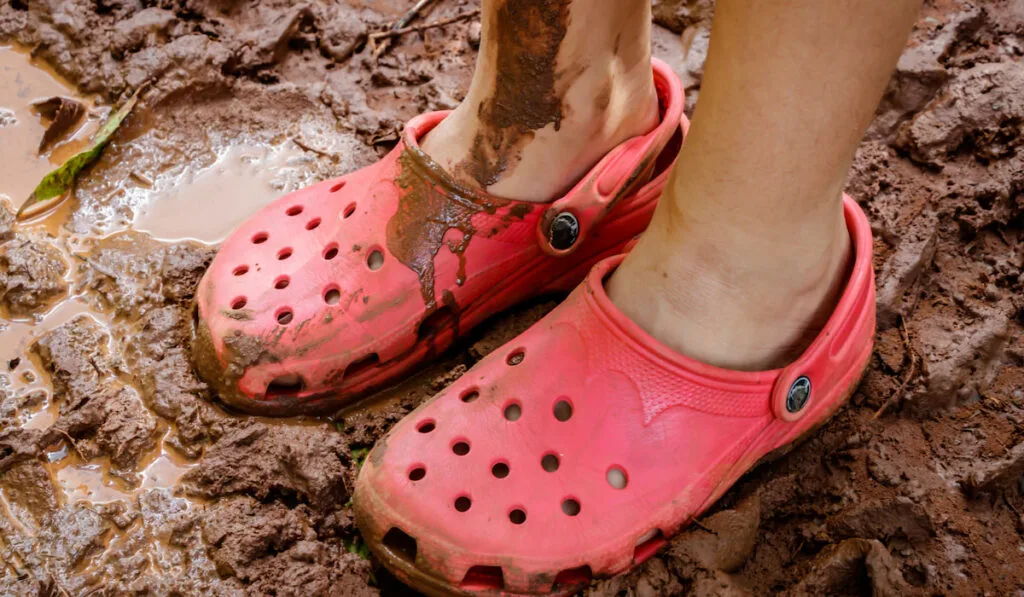
Crocs offer a surprising amount of cushion, ideal for even moderate or advanced climbing.
However, you should opt for something more stable when you’re a novice hiker. This will help you avoid things like sprained ankles and stubbed toes.
If you’re hiking on a trail you feel confident completing, Crocs are some of the most comfortable shoes you can wear.
Your feet can move around and breathe freely. With a nice pair of thermal socks, you can wear Crocs in the colder months.
Crocs are an awesome choice in the summer because you can easily slip them on and off.
Performance
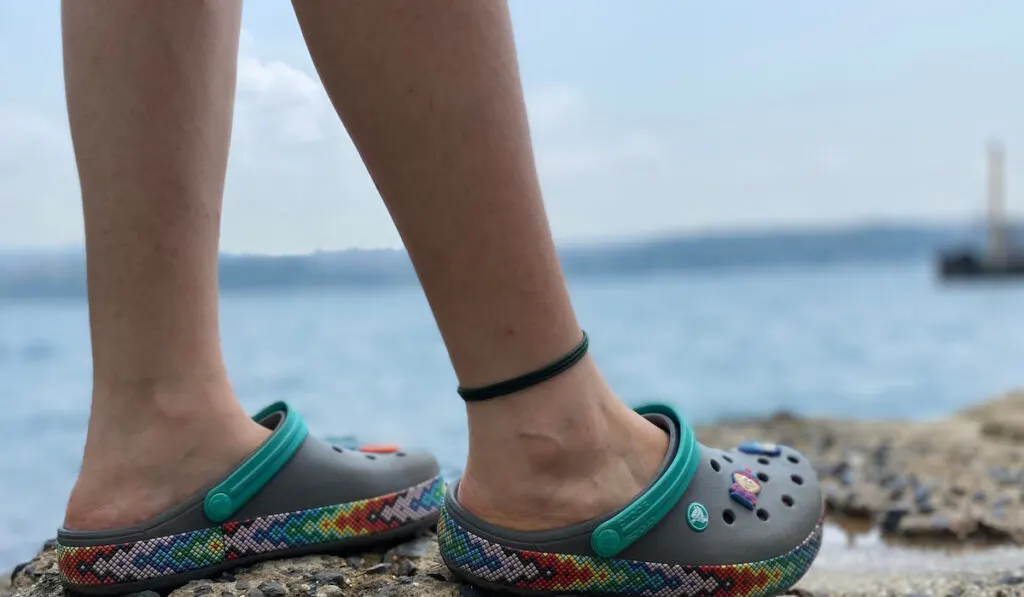
Yes, you read that correctly. Crocs have a lot of benefits that advanced hikers look for in shoes.
Crocs can get wet, dirty, smashed, etc., without worry. You can abuse your Crocs pretty much to the max, and they’ll bounce back impressively.
Their ability to handle water is one of their biggest advantages. With normal hiking boots, you sometimes have to wait hours or days for them to dry after walking in a river or stepping in a puddle.
With Crocs, you can splash around in the water, and they’ll be dry in minutes.
Crocs are dependable shoes that give you precisely what you need and nothing more. They’re not going to get you up the most intense hikes in the world, but Crocs are a versatile shoe that will keep you walking for miles.
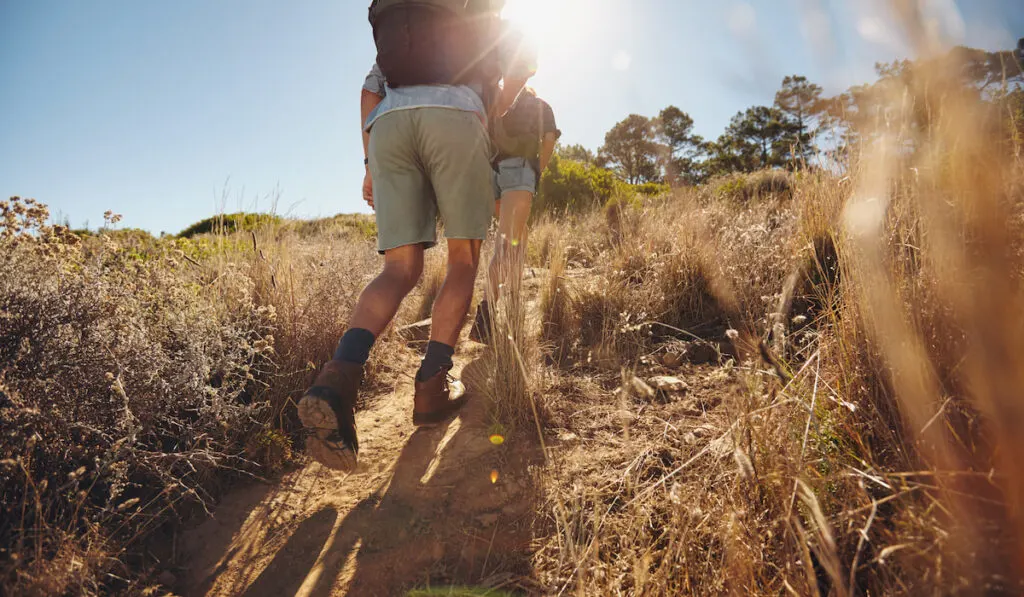
Crocs Aren’t Advanced Hiking Shoes
Don’t make the mistake of thinking that Crocs are something more than they are.
Crocs are nice, comfortable, affordable shoes that can handle most trails. What they aren’t, however, is advanced hiking shoes.
Crocs lack stability and the grip you’ll likely need to get up steep hills or stay on trails with loose dirt and rocks. If you wear Crocs, you can plan on slipping and sliding around as you try to stay on your feet.
You’ll want to remember that Crocs don’t offer great long-term support.
You don’t necessarily want maximum comfort when you’re on long hikes. You need something sturdy enough to keep your feet in good shape.
Without support, you could end up getting a stress fracture in your heel that will sideline you because your feet are pounding down on every step.
With hiking boots or shoes made for walking long distances, you get the firmness you need to reduce the wear and tear on your feet.
Crocs can also become very slippery when wet. Their ability to repel water means that the surface of your Crocs will become very wet and slimy.

Crocs—The Perfect Backup Hiking Shoe
Whether you should or can wear Crocs on a hike depends on how long you’re walking, how challenging the hike is, and how experienced you are at hiking.
For the most part, though, Crocs are up to the task for anything but the most tactical climbs.
For example, a new hiker doesn’t have the foot strength built from years of hiking quite yet. Wearing Crocs for too long exposes their weaker feet to potential injuries.
On the other hand, if you’ve been hiking for years, then Crocs on a weekend trip or a day hike in the woods is totally doable.
Hikers especially love Crocs as a backup hiking shoe.
They are something you can toss in the trunk on your way out and decide on the spot if you want to wear them based on the trail and the weather.

Great on Long Trails
Crocs are also good on long trail hikes that last for weeks or months. You can tie them to your backpack and forget about them because they typically weigh less than a pair of flip-flops.
People hiking the Pacific Crest Trail or the Appalachian Trail enjoy having Crocs to wear for easy portions of the trail, around town to buy supplies, and at night when they call it a day.
If you look online, you’ll see tons of stories about people who wore Crocs for large portions of these epic trails.
You’ll be glad that you have your Crocs after hiking in boots for 20 miles a day.
Some people even wear Crocs for several miles at the beginning of their hikes because it helps warm their feet.
Crocs are a good second option when you want to rest your feet or give them more room to breathe. When you’re not using them, they can hang on your backpack straps, or you can fold them in half and shove them into a compartment.
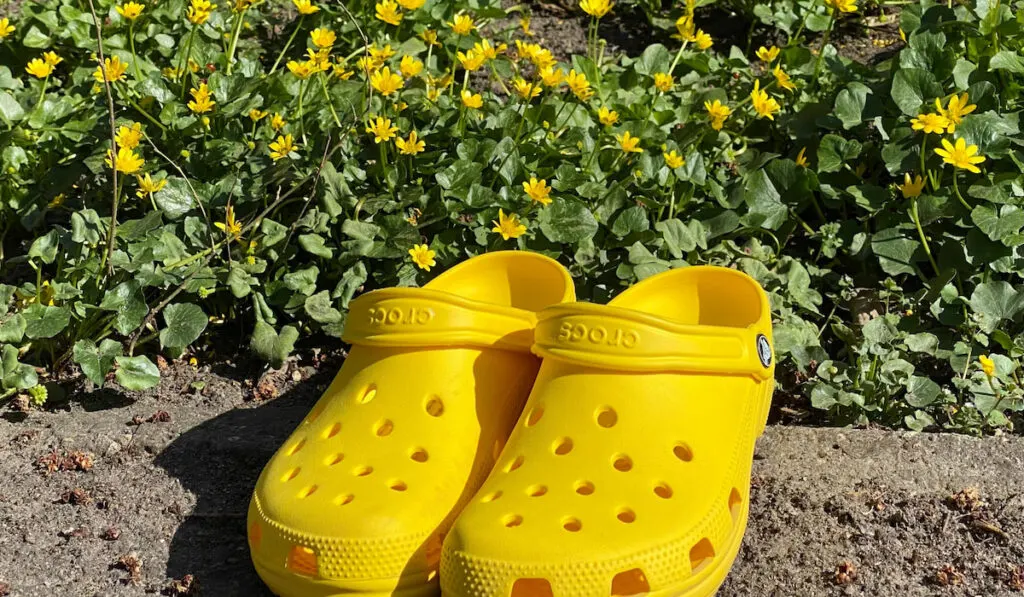
Conclusion—Give Crocs a Try on Your Next Hike
If you’re interested in trying Crocs on a hike, then go for it! They’re not expensive, so you can buy a pair and see whether you like them. You can practically buy them anywhere as well.
Crocs are virtually indestructible.
Whether you start using them on hikes typically depends on what type of trail you’re hiking and your confidence in your ability.
If you’re a seasoned hiker and reasonably fit, then wearing a pair of Crocs on a tough hike is entirely possible. Longer-term, they may thin out a bit and lose some of their treads, but experienced hikers do things like cut slits in the bottom with a razor blade to add some grip.
